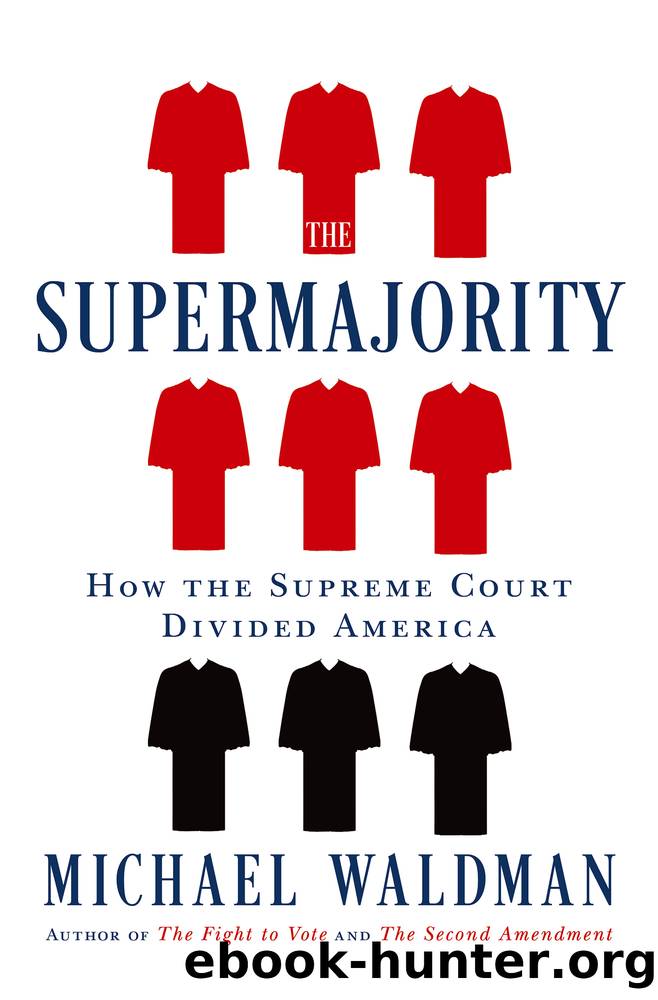The Supermajority by Michael Waldman

Author:Michael Waldman
Language: eng
Format: epub
Publisher: Simon & Schuster
Published: 2023-06-06T00:00:00+00:00
* * *
The second big point about the decision is what it says about the Supreme Court and its approach to past decisions. Little is left of stare decisis. After all, the Supreme Court had upheld Roe v. Wade at least sixteen times since 1973. Now, suddenly, it was âegregiously wrong,â disappeared from the law books.
They say hypocrisy is the tribute vice pays to virtue; this opinion pays a great deal of tribute to principles of stare decisis while blithely ignoring them. Courts have developed standards that set out when precedent should govern, and when an earlier opinion should be overturned. Alito and the others in the majority never really grapple with that. They simply asserted, repeatedly, that Roe was a bad decision, that Casey never ended agitation over abortion, and that the Supreme Court had overturned other cases, too. Plessy v. Ferguson, Lochner, and the case supplanted during the New Deal to produce the âswitch in time,â each are mentioned multiple times, like melodrama villains, brought out to elicit boos.
Standard reasons why a case might be overturned, for example, include new facts. Here there were few new facts, though Alito made a halfhearted point of noting the significance of ultrasound in possibly changing expecting parentsâ views of the issue. Stare decisis also offers certainty and predictability to the rest of society about how to order affairs, what expectations we all have of how our lives can be lived. Alito mocks this as a ârelianceâ interest and says that the only legitimate such concerns are financialâsuch as âthose that develop in cases involving property and contract rights.â As for âthe effect of the abortion right on society and in particular on the lives of women,â well, thatâs just too hard for the Supreme Court to assess.
The reason that the justices made this ruling less than two years after Amy Coney Barrett joined the Court is that they could. The supermajority now has essentially adopted Clarence Thomasâs view that precedent is for suckers, and that if this Court disagrees with an earlier ruling, it can feel free to erase it.
The third major implication of the ruling is what it portends for many other issues and interests.
The majority opinion expressed surprise that anyone could think its logic might threaten other unenumerated rights not âdeeply rooted in this Nationâs history and tradition.â It helpfully lists other cases protecting those rights, just to reassure the reader that they are perfectly safe: Griswold and its protection of the right to contraception, Lawrence v. Texas and its protection of the intimacy of gay couples, Obergefell v. Hodges and its protection of marriage equality, cases protecting against involuntary sterilization, upholding the right to make decisions about educating children, and so on. The more insistent Alito was that these rights are secure, entirely different because they do not involve âfetal life,â the more nervous a reader should grow. At points the opinion could not help itself: Roe âheld that the abortion right, which is not mentioned in the Constitution, is part of a right to privacy, which is also not mentioned.
Download
This site does not store any files on its server. We only index and link to content provided by other sites. Please contact the content providers to delete copyright contents if any and email us, we'll remove relevant links or contents immediately.
The Secret History by Donna Tartt(16670)
The Social Justice Warrior Handbook by Lisa De Pasquale(11495)
Thirteen Reasons Why by Jay Asher(7805)
This Is How You Lose Her by Junot Diaz(5802)
Weapons of Math Destruction by Cathy O'Neil(5050)
Zero to One by Peter Thiel(4839)
The Myth of the Strong Leader by Archie Brown(4796)
Promise Me, Dad by Joe Biden(4459)
Beartown by Fredrik Backman(4437)
Stone's Rules by Roger Stone(4425)
How Democracies Die by Steven Levitsky & Daniel Ziblatt(4421)
The Fire Next Time by James Baldwin(4352)
100 Deadly Skills by Clint Emerson(4089)
A Higher Loyalty: Truth, Lies, and Leadership by James Comey(4043)
Rise and Kill First by Ronen Bergman(4026)
The David Icke Guide to the Global Conspiracy (and how to end it) by David Icke(3897)
The Farm by Tom Rob Smith(3880)
Secrecy World by Jake Bernstein(3791)
The Doomsday Machine by Daniel Ellsberg(3741)
